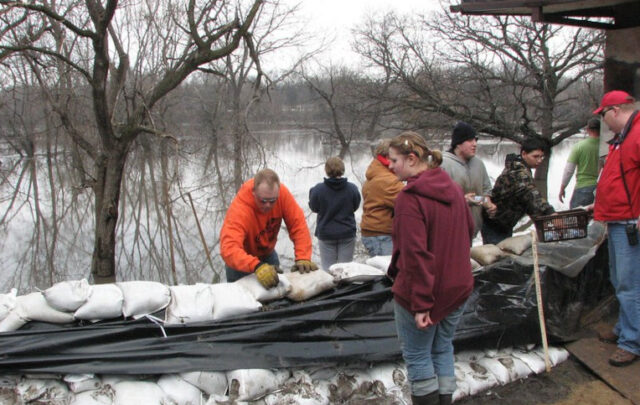On a balmy September evening in the Bay Area, 27 people gather at World Centric in Palo Alto to learn about the resilience circle movement. Many are already participants in Transition Palo Alto, and bring a mature understanding of the ecological basis of our collective pain. Others come at the invitation of friends, or out of curiosity. They’ve come to learn about local consciousness raising groups that face economic stress together in a supportive setting. As the evening progresses, the group experiences the power of a primal ritual. Some might attend the same event and argue that a ritual never took place. But, like any good story, it always happens when humans tap into the collective wisdom of the faces around the fire.
An opening reading from Meg Wheatley, Turning to One Another, sets the tone. Each voice contributes a line of the reading in turn, as though a Greek chorus had arrived just for the occasion. A round of introductions reveals a cast of characters that you might stereotype as comfortable, middle class residents of Silicon Valley, ground zero of American prosperity. The magic begins.
“What are the economic signs of the times?” facilitator Debbie Mytels asks. The room erupts with a familiar narrative. Small, local businesses are closing, and we’re seeing more empty storefronts. So many people don’t have health insurance, and six of them here in the circle. Adult children are living at home with their parents. Business people are running our education system. Worker productivity has increased over 40 years, but wages are stagnant. America has become an auctioning block of deep online discounts. Sailboats are going for a bargain at $2500. People who still have jobs are doing the work of three or more people. Employees of huge global enterprises are anxious, stressed, isolated, crying at their desks, and taking large doses of antidepressants.
The list goes on. A Stanford professor asked a student to lecture on dumpster diving. A technical writer with a PhD in English from Stanford couldn’t get a three-year supplemental employee contract renewed at a global software company. Another PhD had to go to Korea to find a job. People we know are internalizing the pain and blaming themselves, taking unhealthy solace in spectacle, illusion, and fast food. When the anesthesia wears off, the pain returns.
After an outburst of insights like these, the reading for Facing Economic Change simply cements in what’s already been said. Tough times lie ahead, and we are in a stage of fundamental transition. We won’t have more debt-fueled economic growth, and our economic model is not ecologically sustainable. A resilience circle is a place to support one another and prepare. The choir in the room wants to burst into song, but first the facilitators want to discuss cultural messages about the economy.
As more voices contribute to the circle, the burgeoning energy of the narrative takes on a life of its own. The media glorifies the wealthy and sets impossible standards, too many of us taking comfort in the hope that we’ll become “one of them.” Pundits foment fear. Talking heads scapegoat the poor, immigrants, feminists, gays, academics, the “elite liberal establishment”—anyone we don’t know well enough to hear their story. “You’re on your own.” “Be afraid.” “The world is divided into winners and losers, and losers shouldn’t get anything.” “The private sector and the invisible hand of the free market will fix everything.” “Go shopping.” “It’s your own damn fault.”
People are ready to talk about themselves, and the agenda opens the floodgates. The group breaks into pairs for a discussion question. “What are one or two ways that the economic crisis is touching you, or someone you love?” After ten minutes the group reconvenes to share back, and facilitator Thomas Atwood can’t write fast enough on his easel pad.
It starts with everyday frustrations, such as the distractions of an interrupt-driven lifestyle, hidden fees and penalties from banks, and 40 minutes on the phone trying to cancel a DSL service. It gets worse. Six people in the room have no health insurance, and one gave up in frustration trying to get through the process of comparing plans. A brother in law was laid off at age 65 just as he was asking for time off for surgery. One participant attributes a huge rent increase to a landlord trying to recoup his stock market losses. Another person had a 53% rent increase in January. A sister with a ten-year-old daughter has been homeless for three years, making her way through the shelter system and relying on the generosity of friends. Another woman volunteers for a rotating shelter at her church. After a series of job losses, a sister who started out as an Executive Director of a San Francisco non profit has given up on having a professional life in the US, and is now working in Afghanistan. A friend is living in a truck in the parking lot where someone works. Financial stress is forcing one woman to sell her house, which she characterizes as “her paradise.”
Mytels handles the logistics of next steps with a deftness born of years of experience as a community organizer. The group will take the seven-session curriculum from the national Resilience Circle Network together and finish by Thanksgiving. After working out the details, the group closes by standing in a circle and reading an excerpt from the Rev. Dr. Martin Luther King’s 1964 Nobel Peace Prize acceptance speech: “… I am not yet discouraged about the future. Granted that the easygoing optimism of yesterday is impossible.”
As if leaving is difficult, many linger in the room for conversation and debriefing. By 3:41 AM, Bart Anderson (a Transition Palo Alto organizer) has set up a Yahoo Group for the new resilience circle, saying that “I was keyed up after the great meeting of the Resilience Circle, so I thought I would use some of that energy productively.”
“It goes on one at a time,
it starts when you care
to act, it starts when you do
it again after they said no,
it starts when you say We
and know who you mean, and each
day you mean one more.”
– From The Moon Is Always Female, by Marge Piercy
Contact Thomas to get involved in a circle in Redwood City or Palo Alto: [email protected].





